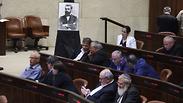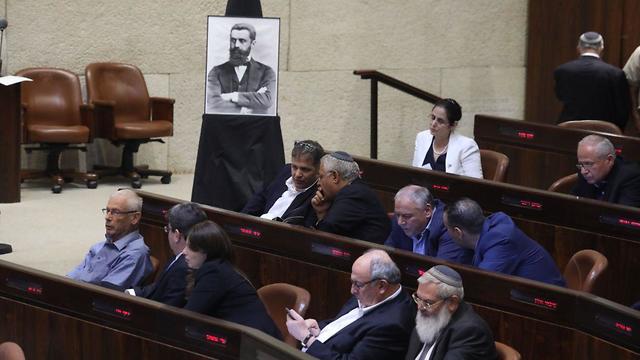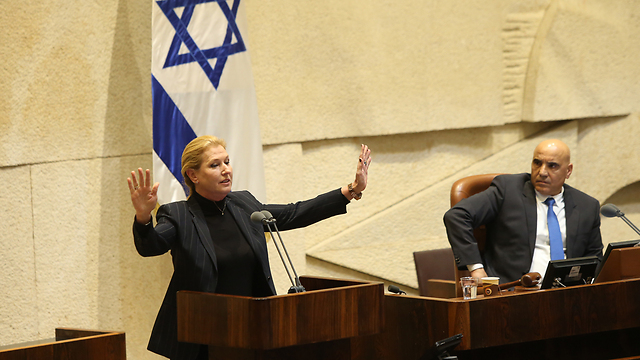
The Knesset's plenum
צילום: דוברות הכנסת, יצחק הררי
Nationality Bill passes its first reading
Concluding Knesset session into the wee hours, plenum approves contentious Basic Law: Israel as the Nation State of the Jewish People proposal; 64 MKs vote in favor, 50 object; bill an 'insurance left behind for future generations,' sponsor MK Dichter says; bill divides country into 'Jews with rights, everyone else as tolerable guests,' MK Tibi counters.
The Knesset plenum on Monday night approved Basic Law: Israel as the Nation State of the Jewish People in its first reading. Sixty-four Knesset members supported the proposition, while 50 MK voted against it. The bill passed a preliminary reading in May of last year.
 MK Dichter presented the bill at the beginning of the session, saying, "The Nationality Law is the insurance policy we will leave behind for future generations. The State of Israel is the nation state of the Jewish people."
MK Dichter presented the bill at the beginning of the session, saying, "The Nationality Law is the insurance policy we will leave behind for future generations. The State of Israel is the nation state of the Jewish people."


The bill will now go to a special committee chaired by MK Amir Ohana (Likud) for preparations for its next readings.
The bill, commonly known as the "Nationality Law", was drafted by MK Avi Dichter and other lawmakers and seeks to anchor in a Basic Law the definition of Israel as the Jewish and democratic nation state of the Jewish people, as well as the state's symbols, Jerusalem as the country's capital, Hebrew as its official language and Arabic as a language with special status.

The Nationality Law passed its first reading in the plenum overnight (צילום: דוברות הכנסת, יצחק הררי)
"That is a clear, hard fact, but despite it all—70 years on—it is unfortunately not yet clear to everyone, and is certainly has not been anchored in any law," the Likud MK lamented.
Tackling criticism levied against the bill, Dichter explained, "Each individual has rights as an individual, and the law does not address the rights of a populace or a resident as individuals, but rather the national character of the country. I think quite a few of the law's detractors have failed to actually read it."

Bill's main sponsor MK Dichter said the bill did not refer to individuals as such but rather the basic character of the state (צילום: ערוץ הכנסת)
One such detractor was Meretz Chairperson MK Tamar Zandberg, who said, "This law is a perfect example of the phrase 'If it ain't broke, don't fix it' also has a second portion: 'If you try to fix something that isn't broken anyway, you can do damage, and lots of it.' This is what this law does: it doesn't do any good, but rather a lot of damage."
"What's so wrong with the phrasing of the Declaration of Independence? Could we not take that and make it a Basic Law? As a Jewish person, as a member of the Jewish people, who have received national recognition in the form of the State of Israel, I'm ashamed," she exclaimed.
Zionist Union MK Tzipi Livni spoke against the bill as well, professing her belief that "defending our Jewish and democratic sate from enemies is a task for the highest order, but the country should also be protected from the actions of its current government. A government that thinks, says and tells that democracy means the majority rules alone? Someone needs to send it to civics class."
Yesh Atid parliamentarian Yael German echoed Livni's sentiments, who said, "The government thinks democracy is majority rule, and that alone. Democracy is not majority rule, democracy is a system of government in which values, civil rights and above all minority rights are preserved."
The law did not face objections from merely the opposition, however, as Likud MK Benny Begin also spoke out against the law's language. "I'll hazard a guess that a Nationality Bill that does not afford equal rights to all of Israel's citizens will not pass its third reading, but in the meantime those annulling such a statement have the upper hand, making the bill faulty. I therefore cannot support it, both for what it omits and for what it includes," he stated.
Begin's fellow party member MK Ohana, meanwhile, said he "did not know many laws that have been afforded special committees that will hold so many discussions on each article and each letter of the bill," adding the bill was sent to its first reading after a considerable number of changes were implemented.
Joint List MK Ahmad Tibi concluded objections, saying, "What the law actually declares is that there are two kinds of civilians. One group comprised of Jews that has rights, and the other comprised of tolerable guests. The law practically determines Jews-only communities. If that's not racism, I don't know what is."

Joint List MK Tibi said the law will divide the country to Jews and 'tolerable guests' (צילום: גיל יוחנן)
Among the bill's other articles are ones setting the Hebrew calendar as the country's official calendar and enshrines Independence Day and other Jewish holidays, events and memorial days in law.
The bill's explanatory remarks said, "The bill's aim is to enshrine in basic legislation the identity of the State of Israel as the nation state of the Jewish people, as well as adding a series of instructions to its constitutional framework dealing with the country's fundamental characteristics as a Jewish state."
"The proposed Basic Law will join existing Basic Laws, anchoring other components in the State of Israel's character as a Jewish and democratic state, in light of the principles contained in the country's Declaration of Independence," the remarks concluded.
Before reaching the first reading phase, the bill drew ire and scathing criticism from all flanks of the opposition, especially members of the Joint List. Haredi parties, however, were also uneasy with a bill defining Israel as the nation state of the Jewish people, thereby detaching the country's attachment to Judaism and the Torah, as per their members.











